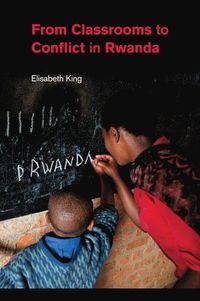
endast ny
From Classrooms to Conflict in Rwanda
This book questions the conventional wisdom that education builds peace by exploring the ways in which ordinary schooling can contribute to intergroup conflict. Based on fieldwork and comparative historical analysis of Rwanda, it argues that from the colonial period to the genocide, schooling was a key instrument of the state in contributing to the construction, awareness, collectivization and inequality of ethnic groups in Rwanda - all factors that underlay conflict. The book further argues that today's post-genocide schools are dangerously replicating past trends. This book is the first to offer an in-depth study of education in Rwanda and to analyze its role in the genesis of conflict. The book demonstrates that to build peace, we cannot simply prescribe more education, but must understand who has access to schools, how schools are set up, and what and how they teach.
Utgiven: 2015
ISBN: 9781107557550
Förlag: Cambridge University Press
Format: Häftad
Språk: Engelska
Sidor: 226 st
This book questions the conventional wisdom that education builds peace by exploring the ways in which ordinary schooling can contribute to intergroup conflict. Based on fieldwork and comparative historical analysis of Rwanda, it argues that from the colonial period to the genocide, schooling was a key instrument of the state in contributing to the construction, awareness, collectivization and inequality of ethnic groups in Rwanda - all factors that underlay conflict. The book further argues that today's post-genocide schools are dangerously replicating past trends. This book is the first to offer an in-depth study of education in Rwanda and to analyze its role in the genesis of conflict. The book demonstrates that to build peace, we cannot simply prescribe more education, but must understand who has access to schools, how schools are set up, and what and how they teach.
Ny bok
319 kr335 kr
5% studentrabatt med Studentapan
Begagnad bok (0 st)
Varje vecka tillkommer tusentals nya säljare. Bevaka boken så får du meddelande när den finns tillgänglig igen.



